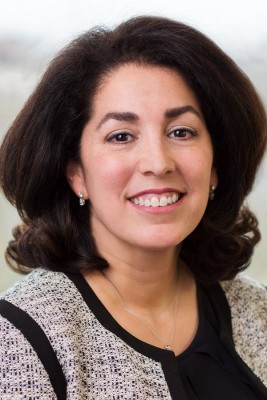
Sonia Galindo Cudd’s business card might read, “general counsel and secretary,” but that only begins to tell the tale of what she provides her company.
Cudd works for Rosetta Stone, the company best known for helping people learn new languages at their own pace. As general counsel, Cudd helps the company look into new ventures, internalize what it is trying to accomplish, and finds solutions to reach goals in a compliant way. Cudd, however, doesn’t see herself as a “legal eagle,” but as a business partner. Her primary focus may be on contracts, governance and legal advice, but she and her team take pride in assisting in the company’s advancement inside and outside of the legal scope.
“I work with the leadership team and the board of directors to find business solutions, execute on our strategy, and manage global risk,” she says. “I love being able to own it with the business. I say to my entire legal team, ‘We have to be more than just legal experts, we have to be true business partners.’”
Cudd’s enthusiasm for being multifaceted stems from her business origins. As an undergraduate at Hood College in Washington, DC, her focus was finance and economics. After graduation, she landed a job as a financial analyst with Citibank, where the company’s chief financial officer became her informal mentor. As she moved up the ranks, the promotion opportunities began to run out—unless Cudd went to graduate school. She began to consider her options. Her mentor recommended she pursue a law degree instead of an MBA, pointing out that Cudd spent most of her day working with lawyers.
“I thought it was a really smart idea, and something that interested me, so I applied to law school,” Cudd says.
After graduating from the John Marshall Law School, Cudd started her legal career with the US Securities and Exchange Commission (SEC) in the corporate finance division. The position provided her with a great opportunity to absorb the intricacies of security law from the people who wrote and interpreted those laws. At the SEC, she reviewed deals that were featured on the cover of the Wall Street Journal. “It really was a unique time, and I got to build my expertise in that subject matter,” Cudd says. “I loved securities law because I thought it made sense. And I loved the deals.”
After a few years with SEC, Cudd rounded out her expertise by working in private practice. Her security background was an asset, but she found herself wanting to expend her knowledge into other matters like contracts, intellectual property, executive compensation, and governance.
“What’s always been my core is that business perspective,” Cudd says. “When I had the opportunity to move in-house, it was a natural next step where I felt I could be the most valuable as a true business partner. In-house, you get to be on the development and execution of something.”
Cudd ending up at Rosetta Stone was serendipitous. She was ready to serve as a general counsel and, as it turned out, the chair of the audit committee of Green Mountain Keurig—where Cudd was working at the time—learned from Rosetta Stone’s audit committee chair that Rosetta Stone needed a general counsel. Cudd’s colleague knew she’d be a good fit and recommended her.
“It was so great. I call it ‘six degrees of lawyer separation,’” Cudd says.
As it turned out, Cudd was the perfect fit for Rosetta Stone when she came on board in January 2015. For starters, she brought that strong business background, which gave her an internal business approach. She could assess the whole picture instead of just saying, “Here’s the risk or here’s the rule.” Since the company was, and still is, going through a restructure and transition, having someone solution-oriented with financial expertise, like Cudd, was ideal.
“Much of the time, the people who are using our products are looking for a life-changing avenue, wheather it’s career-wise, family, or life, as they are moving to another country. It’s so easy to be passionate about the company.”
The pairing has also worked well on a personal level for Cudd. She loves that the company can change people’s lives through the power of language and literacy education. Rosetta Stone isn’t just helping people learn a new language, but on its literacy side, the company is also helping children get up to their proper reading level.
“I’ve always been a big advocate for education,” Cudd says. “Much of the time, the people who are using our products are looking for a life-changing avenue, whether it’s career-wise, family, or life, as they are moving to another country. It’s so easy to be passionate about the company. I love that our product literally changes people’s lives.”
While some teams at Rosetta Stone are driven by profitability and others by growth, Cudd and her team are tasked with taking an all-encompassing view. Currently, one of the company’s big initiatives is handling data privacy, which is incredibly fluid as the laws aren’t yet settled. Cudd’s approach is to be creative. She feels that her team is capable of coming up with some truly innovative solutions.
“It’s a great group of people,” Cudd says. “I have such respect for them professionally, and I really like them personally. It’s wonderful to come to work every day with such a bright, energetic, fun group of professionals.”
Rosetta Stone’s general counsel also feels like she is in an environment that fosters learning at every level. “I’m honored and grateful to have the opportunity to work here,” Cudd says.
Rosetta Stone: By the Numbers
Rosetta Stone has three divisions in its portfolio: language-learning, children’s literacy, and brain fitness solutions.
Rosetta Stone offers courses in more than 30 languages, ranging from Russian and Vietnamese to Navajo and endangered languages like Chitimacha.
Rosetta Stone’s language-learning solutions are available in more than 150 countries.
Rosetta Stone’s Lexia Learning division is a leader in the education space, helping millions of students build fundamental reading skills.
Approximately 15,000 schools and colleges in the United States have incorporated Rosetta Stone software into their instruction.
Rosetta Stone’s Fit Brains program offers cognitive stimulation across six major brain areas (focus, memory, speed, logic, visual, and language) and is based on cognitive data from more than 300 million brain training sessions.
Rosetta Stone language programs are immersion programs, designed to mimic how children learn their native languages. Each course has five levels, with each level taking about 40–50 hours to complete.

